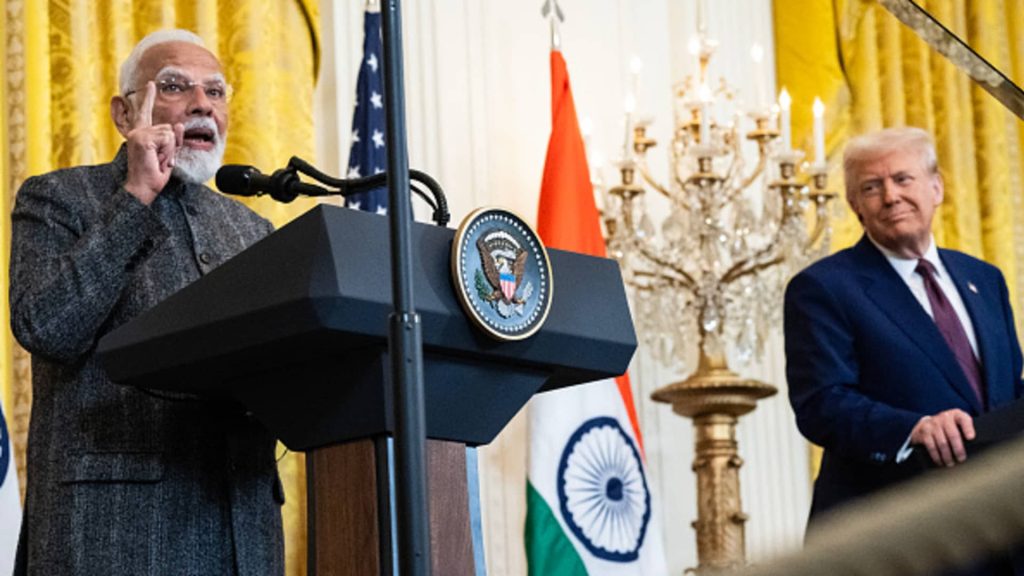In a recent phone call, Indian Prime Minister Narendra Modi conveyed his dissatisfaction to U.S. President Donald Trump regarding Trump’s assertions of having mediated a ceasefire between India and Pakistan. The conversation followed a series of tensions between the two nations, stemming from a deadly attack in Kashmir earlier in May. Modi emphasized India’s position against foreign mediation in its affairs, asserting a unified political stance within the country.
| Article Subheadings |
|---|
| 1) Tensions Between India and Pakistan |
| 2) Modi’s Firm Stance on Mediation |
| 3) The Role of Trump in De-Escalation |
| 4) Recent Developments and Future Implications |
| 5) Summary of the Call and Political Reactions |
Tensions Between India and Pakistan
The ongoing conflict between India and Pakistan has persisted for years, often resulting in military confrontations and diplomatic challenges. Recently, tensions escalated after a terrorist attack in Kashmir led to the death of 26 civilians. The attack prompted India to respond aggressively, resulting in a four-day military conflict marked by airstrikes and military maneuvers from both sides. The historical backdrop of animosity includes territorial disputes over regions like Kashmir, which both nations lay claim to. This volatile situation underscores the influence of geopolitical dynamics in South Asia, especially as both countries possess nuclear capabilities.
Modi’s Firm Stance on Mediation
During the recent phone call, Prime Minister Modi articulated India’s strong position against any form of international mediation, particularly from the United States. Foreign Secretary Vikram Misri reported that Modi “clearly conveyed” to Trump that India’s government holds a complete political consensus on this issue—emphasizing that the country does not seek outside intervention in its affairs. Relying on this nationalistic sentiment, Modi stated that India’s sovereignty and autonomy are paramount and must not be compromised by external dialogue or interference, especially from leaders like Trump who frequently boast about their influence over international conflicts.
The Role of Trump in De-Escalation
President Trump has positioned himself as a crucial mediator in the India-Pakistan conflict, claiming to have facilitated talks that led to the de-escalation of military tensions. However, his assertions have drawn skepticism, particularly from Indian officials. In the wake of the phone call, Trump reiterated to the media that he had a significant role in preventing a potential war, publicly touting his relationship with Modi and calling him “a fantastic man.” This perspective has raised eyebrows, given Modi’s unwavering stance against external mediation. Observers question whether Trump’s portrayal reflects actual diplomatic achievements or is primarily a facet of his domestic and foreign political narrative.
Recent Developments and Future Implications
The dynamics between the U.S., India, and Pakistan continue to evolve, with recent events revealing the underlying complexities of their interactions. Trump’s decision to host Pakistan’s Army Chief for lunch at the White House elicited a stern reaction from New Delhi, signaling a potential shift in diplomatic relations. The President’s statements on exploring a trade deal with Pakistan also added fuel to the already heated dialogue. Following the lunch, there were interests from both sides about future cooperation; however, the responses from India suggest a tense atmosphere moving forward. Modi’s cancellation of their scheduled meeting at the G7 summit in Canada further illustrates growing friction between the two leaders.
Summary of the Call and Political Reactions
The phone call between Modi and Trump, reported to last 35 minutes, is indicative of an ongoing chess game of international diplomacy, with both leaders asserting their positions on the global stage. Modi’s refusal to entertain Trump’s claims about mediation illustrates a clear delineation in diplomatic expectations. The lack of a detailed readout from the White House might suggest that the call did not yield progress towards understanding or cooperation. Reactions to these developments are expected to shape future engagements not only between the U.S. and India but also in relations involving Pakistan. As geopolitical tensions remain precarious in the region, officials will need to navigate this landscape carefully to prevent conflicts from escalating further.
| No. | Key Points |
|---|---|
| 1 | Modi expressed frustration over Trump’s claims of mediating between India and Pakistan. |
| 2 | India maintains a strong stance against foreign mediation in its affairs. |
| 3 | Trump asserts he played a crucial role in de-escalating the conflict between the two nations. |
| 4 | Trump’s meeting with Pakistan’s Army Chief led to tensions with India. |
| 5 | The geopolitical climate remains fragile, with potential ramifications for U.S.-India relations. |
Summary
The recent dialogue between Prime Minister Modi and President Trump unveils the intricate dynamics defining India-Pakistan relations and the tensions with U.S. involvement. As Modi firmly rejected claims of mediation and reiterated India’s stance on sovereignty, the call signifies a decisive moment in how diplomatic relations are navigated among these nuclear-armed nations. The backdrop of military conflict coupled with domestic political narratives paints a broader picture of geopolitical relations that require careful maneuvering to avert further escalation in South Asia.
Frequently Asked Questions
Question: What was the purpose of Modi’s phone call with Trump?
The call aimed to address Modi’s dissatisfaction with Trump’s claims of mediating a ceasefire between India and Pakistan, which Modi firmly rejected.
Question: How have India and Pakistan’s relations been affected by recent events?
Recent military confrontations, including a deadly terror attack in Kashmir, have aggravated tensions, leading to military responses and a fragile diplomatic balance.
Question: What role does the U.S. play in the India-Pakistan conflict?
While Trump has positioned the U.S. as a mediator, India’s government explicitly rejects any foreign mediation, emphasizing its stand on sovereignty.
